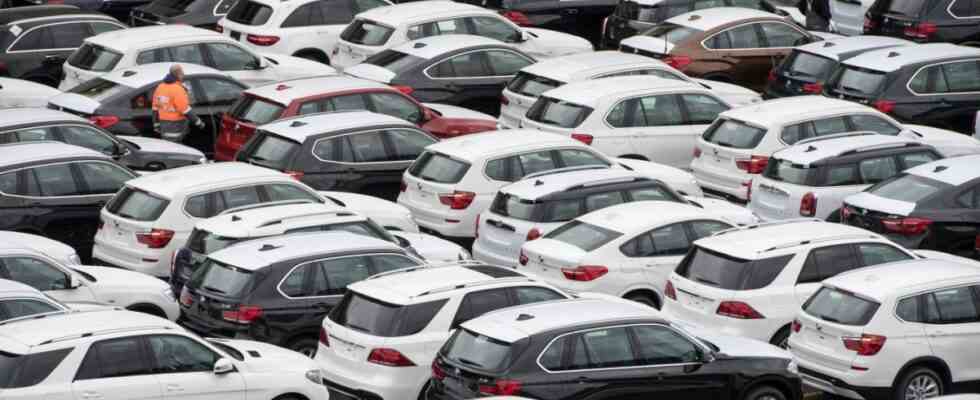Not a good prospect for car dealers in Germany: According to a study by the Institute for the Automotive Industry (Ifa), only just under 4,000 of the 6,800 car dealerships in Germany will remain by 2030 – the industry is changing. Where as a customer you used to go to the car dealership to get advice from a specialist and complete the purchase there, you can now put together your own dream car with just a few clicks on the Internet and order it online. Experts estimate that by 2030 over 50 percent of new car business will be conducted online. This is already the reality for the used car trade – it takes place almost entirely online.
A development that is particularly worrying for smaller car dealerships, also in the Ebersberg district. “You can’t keep up with the big ones,” says Johann Wisneth. In his company he brokers Subaru vehicles in Ebersberg. Although there are still customers who come to him, the numbers are slowly decreasing. In addition to rising prices, it is above all the very long waiting times that deter many customers. According to Wisneth, this leads to many potential new car buyers deciding to continue driving their old vehicle. That’s why it’s primarily the repair business that’s “buzzing” at the moment. But the problem: The increased material and personnel costs ensure that drivers also try to save.
The lucrative repair business is not only going well at Wisneth. Other car manufacturers and workshops in the district also report on this. However, due to increasing electromobility, many things could change here in the future. Service work such as changing the oil, on moving parts or spark plugs – none of this will be required to the same extent in the future. The consequence of this is that the staff in the workshops will have to retrain or fear for their jobs in the future.
“When the corona lockdown started in China, the problems started for us”
Thomas Lechner sees things differently. He is the managing director of the Müller Zorneding (Suzuki) car dealership. According to Lechner, it is a fallacy to believe that the repairs to the new cars would be fewer and therefore cheaper. “On the one hand, it takes longer to find a fault. On the other hand, an electrician’s hour is significantly more expensive than a mechanic’s hour.”
Similar to Johann Wisneth, however, he sees the root of the problem of the declining number of car sales in the supply chain and not in the rising prices due to inflation. “When the corona lockdown started in China, the problems started for us,” says Lechner – the deliveries stopped. “When the companies started production there again, the containers with the parts were in Bremerhaven at the terminal,” he continues. Because there was a lack of personnel for onward transport.
At Lechner, waiting times of between six months and a year not only mean that the repair business is booming, but also the used car market. And: “So that customers don’t have to wait too long, car manufacturers such as BMW are now also delivering vehicles before they are completed,” he says. You then have to do the rest of the work yourself in the workshop.
Szuzuki also handles it this way – managing director Lechner knows this from his own experience. “The cars come without a radio and navigation system because they can’t be delivered that quickly – but at least the buyer then has a moving car,” he says. Are the customers angry about it? no After all, they would know that the problem is not with the company. And the solution to the problem? Local delivery capabilities should be expanded. “Globalization is both a blessing and a curse,” says Lechner, summing up the situation.
Car manufacturers are no longer keen on working with small companies
Similar to his colleagues in the district, Leopold Grill also observes that potential buyers are deterred by the long waiting times. He is managing director of the Grill Group, which offers the service for several well-known car manufacturers in the Ebersberg district, but also in Erding. But in addition to the delivery difficulties, other factors also play a role in why the automotive industry is in this situation. “New cars are becoming less attractive due to price increases and high interest rates,” says Grill. “As a result, more buyers, whether commercial or private, are switching to used cars.” What are his forecasts for the car trade? That is a difficult question to answer. But what you do What I can say is that manufacturers no longer want to work so much with small companies, but only with larger groups.His forecast is therefore in line with that of the Institute for the Automotive Industry.
In times of e-mobility, e-customer advice and e-commerce, the question arises: What will happen next for the car dealerships in the Ebersberg district? Thomas Lechner from Autohaus Müller in Zorneding reacts calmly to the dark forecasts of his colleagues and the Institute for the Automotive Industry: The small family business has been around for 40 years “and will be around for a long time”.

